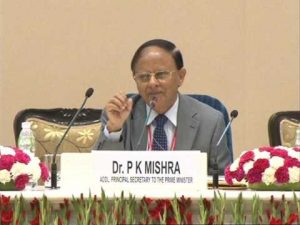Disaster funding to States need to be responsive, says Dr. P.K. Mishra
The Additional Principal Secretary to the Prime Minister Dr. Mishra urged the Fifteenth Finance Commission to look into whether the funds with the states are adequate.

A Hazard Risk Index can be developed and the vulnerability score of the state can be measured highlighted a presentation made by United Nations Development Programme (UNDP) and Indian Institute of Human Settlement as part of the International Workshop on Financing Disaster Risk Management in India.
Parameters of the index should include Hazard Profile of the state and Multidimensional Poverty Index (MPI) of the State as per the presentation. It also held that a credible data system that is publicly available is needed; effective safety nets need to be included so as to speed up the ability to move money quickly into the hands of victims of droughts, floods etc, and Centre-State matching grants to prepare for the resilience should be made available given the context of increasing frequency and severity of disasters.
“The Finance Commission which is responsible for advising the Government on the nature and form of Grants-in-Aid to the States conducted the two-day workshop.”
These presentations were made by keynote sessions on Overview of the evolution of DRM and Financing Urban Resilience in India respectively based on the studies commissioned to them by the Commission.
Also Read: Earthquakes threaten the entire Delhi NCR at the highest level: Muralee Thummarukudy
The Chairman of the Fifteenth Finance Commission (XV FC), N K Singh in his opening remarks highlighted the changing paradigm of disaster management in the wake of changed trilogy of Risk, Responsibility and Resources due to increased number of stakeholders and the complexity. He mentioned the need of coherent response in financing of Disaster Risk Management (DRM) by public, private and multilateral institutions. He also emphasised on the need to look into mitigation aspect in Disaster Management.
Jointly organised by XV FC, National Disaster Management Authority (NDMA), UNDP and The World Bank in New Delhi, the opening session was attended by the Chairman, all the members of the Commission, Dr. P.K. Mishra, Additional Principal Secretary to the Prime Minister, Junaid Kamal, World Bank’s Country Director and representatives from various countries, insurance sector and public finance specialists.
Dr. Mishra in his remarks stressed that ‘Business As Usual’ will not work. There is a steady paradigm shift from relief and response centric approach to mitigation, adaptation and preparedness.
India is a signatory of Sendai Framework which has identified investment in resilience as one of its four priorities, he added. He further said that funds given by earlier Finance Commissions had ensured a predictable way of financing post disaster relief and response works.
“Dr. Mishra emphasised on the need to be responsive to the needs of states as they are at the front line of innovations related to disaster resilience activities.”
He urged XV FC to look into it whether the funds with the states are adequate. Striking a balance between funds availability to both National Disaster Response Fund (NDRF) and State Disaster Response Fund (SDRF) is important.
Also Read: Kerala Floods: Dr. Tharoor informally talks Risk, Rehabilitation and Rebuilding at UN
Disaster Relief is one of the major purposes for which grants are provided to the States and is increasingly taking up a larger percentage of grants due to the rising frequency and intensity of disasters every year.
The Terms of Reference (ToR) of XV FC states that the Commission may review the present arrangements on financing Disaster Management initiatives, with reference to the funds constituted under the Disaster Management Act, 2005 (53 of 2005), and make appropriate recommendations thereon. The workshop also witnessed discussions with a focus on state level financing for DRM, diversifying the sources of DRM funds, financing disaster preparedness and mitigation.
